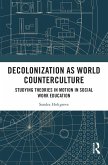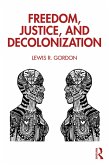While efforts to decolonize knowledge and disciplines continue to expand, this book takes a different, theory-reflecting approach. It examines instead how decolonization itself has become a global although unequally addressed phenomenon. Bringing together world culture research with postcolonial studies in the field of social work, the book analyzes social work curricula from Germany, Mexico, and Ecuador to explore how (de)coloniality is embedded in diverging horizons of meanings but shaped by strikingly similar institutions in the educational setting. To this end, the book offers a knowledge sociological view on how decolonization itself is globalized. It mobilizes the neo-institutional approach of world culture to describe the decolonial imperative as "world counterculture," an integrative frame of otherwise different and diverging social justice agendas. In this way, taking the theoretical premises of decolonization seriously, the book examines the promises and limitations of connecting decolonization with Western theories of globalization.
Assembling these distinct pieces of a puzzle spanning different fields, this book is a testimony to the most successful and thriving theoretical views of the last decades in the human and social sciences. It is sure to challenge, fascinate, and inspire readers across the specialist fields of postcolonial studies, the sociology of knowledge, global social theory, and international social work.
Dieser Download kann aus rechtlichen Gründen nur mit Rechnungsadresse in A, B, BG, CY, CZ, D, DK, EW, E, FIN, F, GR, HR, H, IRL, I, LT, L, LR, M, NL, PL, P, R, S, SLO, SK ausgeliefert werden.









